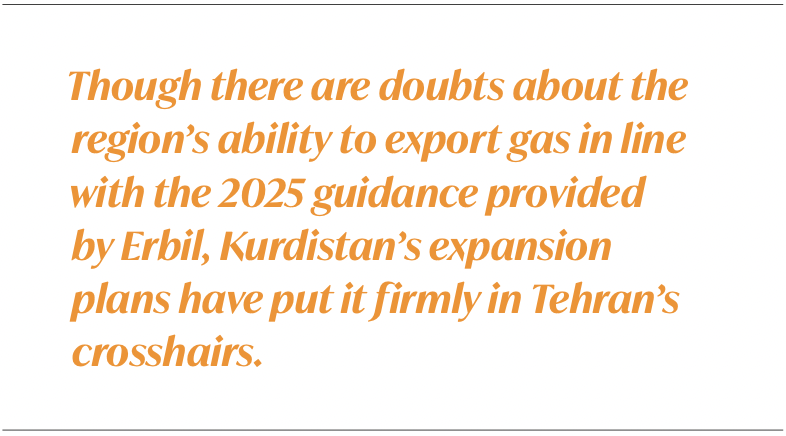Kurdistan under the microscope amid Iraqi political limbo [Gas in Transition]
The failure of Iraq to form a new government is giving rise to uncertainty about the short-term future of the oil and gas sector in both the federal south and the Kurdish north of the country. However, it is the latter that is coming under the most intense scrutiny following repeated calls from the current caretaker administration in Baghdad to end regional oversight of the industry and defer to the Iraqi ministry of oil (MoO).
The April 6 deadline for appointing the next president and prime minister was missed and there are growing fears that the parliament will be disbanded. Voting in a new president – a largely ceremonial position, reserved for Kurds – has not yet been able to take place with just 202 of the required 220 MPs turning up to the latest ballot in late March.
Meanwhile, the MoO has told the Kurdistan Regional Government (KRG) that it plans to create a new state oil firm for the semi-autonomous region that would fall under the control of the ministry and its Iraqi National Oil Co. (INOC).
 Such overtures from Baghdad are nothing new to Erbil though, with Iraqi MPs having petitioned at various points in recent years for all oil exports to be run through federal channels. The situation heated up in February though, when Iraq’s Supreme Court concluded that KRG oil and gas legislation was ‘unconstitutional’; called for contracts with international companies to be scrapped; and said the KRG should hand over all of its oil production to Somo.
Such overtures from Baghdad are nothing new to Erbil though, with Iraqi MPs having petitioned at various points in recent years for all oil exports to be run through federal channels. The situation heated up in February though, when Iraq’s Supreme Court concluded that KRG oil and gas legislation was ‘unconstitutional’; called for contracts with international companies to be scrapped; and said the KRG should hand over all of its oil production to Somo.
The oil marketer then announced this week that the MoO “has taken all the necessary steps” to implement the court’s decision, noting that Somo “is the only official body authorised to market Iraqi oil”. Somo added that the KRG’s agreements with international oil companies are “illegal … as they are in violation of the Iraqi constitution”.
Political wrangling
Such a move is unlikely to promote consensus in choosing the country’s new leadership. The October elections saw Moqtada Al-Sadr’s Sadrist party pick up the most seats and the Shi’ite cleric recently launched a new parliamentary bloc – with the KRG’s ruling Barzani family and the Sunni Al Siyada alliance – in an attempt to form a coalition government. If successful, this would install Sadr’s cousin Mohammed Jaafar Al-Sadr as prime minister with Rebar Ahmed Khalid of the Kurdistan Democratic Party (KDP) taking the presidency.
The coalition would mark a significant move to reduce the influence of Iran, which has exerted significant pressure over policymaking via political and energy interests in Iraq.
However, the MoO and Somo announcements have cast doubt over the likelihood Sadr will be able to find common ground with the Kurds in particular. His hands appear to be tied on the subject of oil exports and the would-be leader will struggle to meet the conditions laid out by KDP leader Masoud Barzani or placate his son Masrour, the president of the KRG, who has already flatly rejected the federal court’s judgement on the region’s oil sector.
While neither side is likely to convince the other to fully acquiesce, Iraq’s incumbent government seems to be offering a form of olive branch to Erbil, holding meetings this week with high ranking KRG officials to “discuss the executive procedures, after the federal court's decision to agree on new and standard mechanisms for managing the oil industry issue in the region, in a manner that achieves the highest benefit and financial returns”.
Gas concerns
Meanwhile, with oil contracts and exports drawing Baghdad’s ire, it is Kurdish gas that has attracted the most unwanted attention. Efforts to tap into European demand – by pipeline through Turkey – have made headlines with rumours of Israeli assistance leading to targeted attacks by Iran’s Islamic Revolutionary Guard Corps (IRGC).
Kurdistan’s KAR Group, which operates oilfields on behalf of the KRG around the Khurmala Dome, owns the Erbil refinery and holds a 40% stake in the region’s oil export pipeline alongside Russia’s Rosneft, has become a target, with missiles striking the villa of its CEO Baz Karim Barzinji and landing near company facilities.
In December, the company was awarded a contract to build a pipeline that will run from the Khor Mor gas field to Erbil and on to Dohuk, just 35 km from the Turkish border. With a conduit already built on the Turkish side that hooks up to pipelines heading west, the link could present the KRG with a route to valuable export markets.
Barzinji’s villa was targeted following reports that it had been the location for talks between Turkish, US and Israeli officials on the topic of connecting the new KAR pipeline to Turkey.
However, the KRG moved to quash speculation about Israeli involvement, saying instead that the expansion of the region’s international energy ties did not sit well with Iran’s interests. Though there are doubts about the region’s ability to export gas in line with the 2025 guidance provided by Erbil, Kurdistan’s expansion plans have put it firmly in Tehran’s crosshairs.
To the south, as the political tug-of-war continues in Baghdad, the permutations of the potential outcomes include wide-ranging consequences not just for federal and Kurdish regions, but throughout the northern Gulf and beyond.



